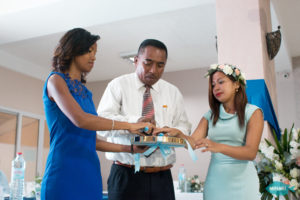Fishing communities are mobilising for their future.
23 NGOs now officially members. A movement on the move.
On 6 March 2018, at Pavé Antaninarenina in Antananarivo, 23 organisations officially became members of MIHARI, a network which brings together fishing communities in Madagascar. During this ceremony, MIHARI also presented the official documents of its operation.
On 7 March, the MIHARI Network devoted a day to consultation with other civil society platforms in Madagascar, with the goal of establishing joint efforts to defend the interests of vulnerable coastal communities. Particular attention was paid to the motions adopted at the Fourth National Forum of the network in Fort-Dauphin in July 2017, expressing the grievances of the small-scale fishers.
Small-scale fishers are among the most vulnerable people in the world. The World Bank estimates that one billion people around the world are getting their protein from the sea. The UN Food and Agriculture Organization (FAO) estimates that 80% of the world's fish production for human consumption comes from small-scale fisheries. The global importance of fishing has never been greater, and this is very much the case in Madagascar as well.
A civil society movement in full swing
In 2012, a collection of Locally Managed Marine Areas (LMMAs) created MIHARI (Mitantana Harena an-dranomasina avy eny ifotony) to consolidate their voices and reduce their isolation. The last MIHARI National Forum, held in Fort Dauphin in July 2017, demonstrated the network's growth as a civil society movement.
The 173 fishing communities represented at the National Forum agreed on three motions to address to the Government of Madagascar, donors, civil society and NGOs working in marine conservation. The three motions were:
- That traditional laws (dina) should be better recognised by the courts,
- That efforts in the fight against destructive fishing gear should be increased,
- That exclusive community fishing zones should be granted to allow the livelihoods of small-scale fishers to not be under direct pressure from industrial fishing boats.
In the final motion concerning the community fishing zones, the communities specifically asked for:
- The recognition and the attribution of a legal status to the Locally Managed Marine Areas established by coastal communities,
- The declaration of a law granting Madagascar’s coastal communities with exclusive fishing rights on a coastal strip to be defined according to the regions, as permitted by the constitution.
- The reinforcement of the control of the national and foreign industrial fishing vessels operating in territorial waters, ensuring the respect of community fishing zones and the regulations on fishing gear and techniques.

Two days of mobilisation for the future of fishing communities
The MIHARI annual coordination meeting, including the approval of the network’s 2018 strategy, were held on 6 and 7 March 2018. The first day was devoted to a ceremony formalising the affiliation of the 23 MIHARI member organisations that work in marine conservation:
Aquatic Service, Asity Madagascar, Blue Ventures, Conservation Centrée sur la Communauté (C3) Madagascar, Cétamada, Conservation International Madagascar, Comité d’Orientation et de Soutien des Aires Protégées (COSAP) Sahamalaza, Development and Environmental Law Center (DELC), Durell, Fanamby, Gret, Louvain Coopération, Missouri Botanical Garden (MBG), Madagascar National Parks (MNP), Museum National d'Histoire Naturelle (MNHN), Opti’Pousse Haie (OpH), PAGE GIZ, Reef Doctor, Service d'Appui à la Gestion de l'Environnement (SAGE), Sehatra Ampandrosoana Haingana ny Ivom-paritra (SAHI), Sustainable Environment, Education & Development in Madagascar (SEED Madagascar), Wildlife Conservation Society (WCS) Madagascar et World Wildlife Fund (WWF) Madagascar.
During this ceremony, these organisations ratified the network's charter, and the MIHARI Network presented their strategy, the criteria for LMMAs in Madagascar, and various documents prepared and adopted at the National Forum. The meeting also allowed the network’s members to discuss the activities and action plan for 2018, in particular advocating for change to political leaders ahead of the presidential elections, in collaboration with other civil society platforms like Tafo Mihaavo, ROHY, Alliance Voahary Gasy and the Réseau Santé Population Environnement.
These two days allowed the MIHARI Network to mobilise their stakeholders, and the movement is on to make Madagascar a role model for traditional fisheries management, for the greater benefit of the coastal population and the country as a whole.
